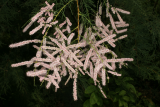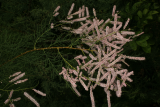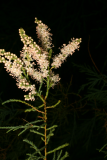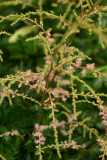Additional notes (click to expand)
Medicinal
Culpeper 1653 “... hath a notable verme against the rickets, and infirmities of the spleen, provokes the terms.”
Culpeper, Nicholas. (1653). The London Dispensatory.
Nomenclature
Now called T. ramosissima.
Tamarix gallica is thought to be the ‘Tamaris’ of Culpeper and the College Pharmacopeia of 1618.
Oakeley, Dr. H. F. . (2013). The Gardens of the Pharmacopoeia Londinensis.
link
Other use
There are three Tamarix plants in the centre of the garden, all different, so we appear to have three different species. Tamarix gallica is thought to be the ‘Tamaris’ of Culpeper and the College. The ‘manna’ referred to in its popular name is an edible substance produced as a result of insect damage, but, strangely, it is not clear if it is the excretion of scale insects or sap from the plant. It may be the manna mentioned as a food in the Old Testament, but there are other plant contenders
Oakeley, Dr. H. F. . (2013). The Gardens of the Pharmacopoeia Londinensis.
link
Tamarix gallica L.
Family: TAMARICACEAEGenus: Tamarix
Species: gallica L.
Common names: Manna tree
Pharmacopoeia Londinensis name: Tamaris
Distribution summary: U.K., Italy, France, Spain
Habit: Shrub
Garden status: Not currently grown
Flowering months: August



